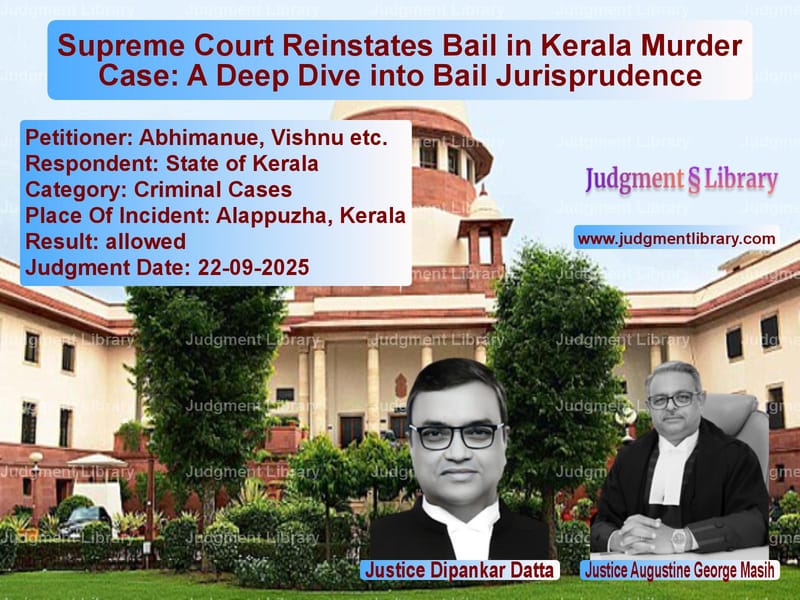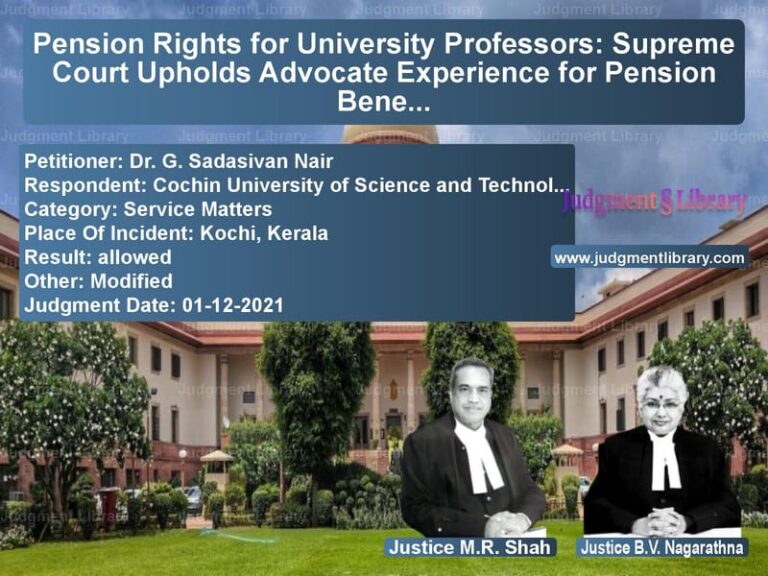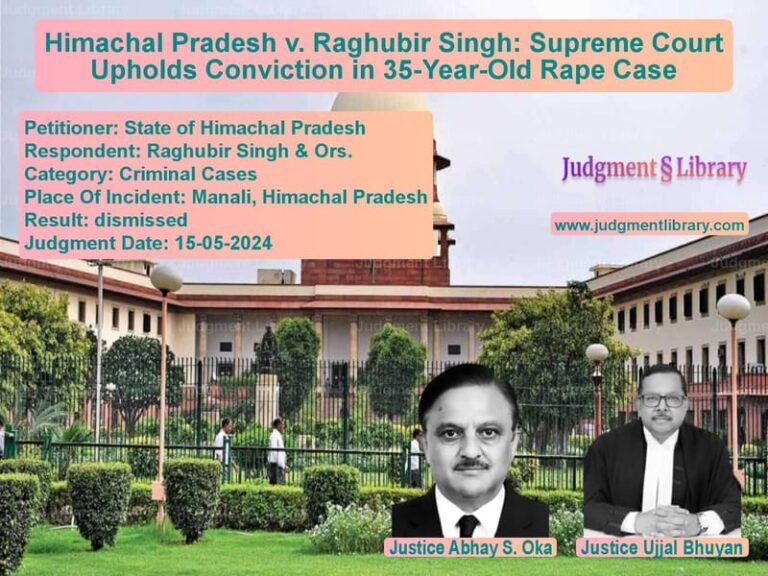Supreme Court Reinstates Bail in Kerala Murder Case: A Deep Dive into Bail Jurisprudence
In a significant ruling that underscores the delicate balance between individual liberty and the interests of justice, the Supreme Court of India, on September 22, 2025, set aside the Kerala High Court’s order that had revoked the bail of five accused in a high-profile murder case. The case, which revolves around the brutal killing of a man in Alappuzha district in December 2021, has traversed a complex legal path, raising fundamental questions about when and how bail, once granted, can be taken away.
The appellants, Abhimanue, Athul, Sanand, Vishnu, and Dhaneesh, were accused of being part of an unlawful assembly that allegedly followed the victim on December 18, 2021, collided with his scooter, and then brutally attacked him, leading to his death later that evening. They were charged with serious offences including murder, conspiracy, and rioting, among others under the Indian Penal Code and the Arms Act. After nearly a year in custody, they were granted bail by the trial court in December 2022. The State of Kerala, however, was not satisfied. It first applied for cancellation of this bail before the Sessions Court, which was rejected in April 2024. Undeterred, the State approached the High Court, which, in December 2024, set aside the bail orders for these five appellants, categorizing them as the ‘actual assailants’ as opposed to mere conspirators.
The Legal Battle in the Supreme Court
The core of the legal dispute before the Supreme Court was whether the High Court was justified in revoking the bail that had been granted over two years prior. The appellants, through their learned senior counsel Mr. Soumya Chakraborty, mounted a multi-pronged challenge. They argued that the State’s application before the High Court, filed more than 18 months after the bail was granted, was unjustifiably delayed. They emphasized that during their time on bail, they had not tampered with evidence, influenced witnesses, absconded, or violated any bail conditions. Therefore, setting aside the bail orders was uncalled for.
Mr. Chakraborty also raised a crucial procedural argument. He contended that since an earlier application for cancellation of bail had already been rejected by the Sessions Judge, the State’s proper remedy was to challenge that order in a revision petition or to invoke the High Court’s inherent powers under Section 482 of the CrPC, and not to file a fresh cancellation application directly before the High Court. He argued that the Sessions Judge’s order refusing to cancel bail had thus attained finality.
On the other side, the State of Kerala, represented by Mr. Dinesh, and the victim’s widow (the second respondent), represented by Mr. R. Basant, urged the Court to uphold the High Court’s order. They argued that the Sessions Court had granted bail in a ‘mechanical manner’ and through a ‘non-speaking order,’ considering only the period of custody and the lack of opposition from the Public Prosecutor, while completely ignoring the gravity of the heinous crime. The High Court, they pointed out, had rightly noted that there was no change in circumstances from the time bail was initially rejected to when it was granted. Mr. Basant highlighted the specific overt acts attributed to each appellant and drew the Court’s attention to their criminal antecedents. A serious allegation was also made against appellant Vishnu (A-2), who was accused of violating his interim bail conditions by entering Alappuzha district and, along with another accused, assaulting and threatening a person named Abhiram, leading to a new FIR.
The Supreme Court’s Analysis and Key Legal Principles
The Supreme Court, comprising Justices Dipankar Datta and Augustine George Masih, began its analysis by addressing the maintainability of the State’s application before the High Court. Dismissing the appellants’ argument, the Court noted that the application was filed under ‘Section 482 r/w 439 (2) of Code of Criminal Procedure’. The Court held, “We are unable to agree with this argument… nothing prevented the High Court from exercising its inherent powers.”
The Court then delved into the heart of the matter: the distinction between cancellation of bail and revocation of a bail order. Relying on the landmark three-judge bench decision in P v. State of Madhya Pradesh, the Court elaborated on this critical difference. It reproduced the key paragraphs from that judgment:
“21. Echoing the above principle, in Ranjit Singh v. State of M.P., it has been held thus: ’19. … There is also a distinction between the concept of setting aside an unjustified, illegal or perverse order and cancellation of an order of bail on the ground that the accused has misconducted himself or certain supervening circumstances warrant such cancellation. If the order granting bail is a perverse one or passed on irrelevant materials, it can be annulled by the superior court.’
22. In Abdul Basit v. Mohd. Abdul Kadir Chaudhary, this Court has opined that: (SCC p. 763, para 19) ’19. Therefore, the concept of setting aside an unjustified, illegal or perverse order is different from the concept of cancellation of a bail on the ground of accused’s misconduct or new adverse facts having surfaced after the grant of bail which require such cancellation…’
24. As can be discerned from the above decisions, for cancelling bail once granted, the court must consider whether any supervening circumstances have arisen or the conduct of the accused post grant of bail demonstrates that it is no longer conducive to a fair trial to permit him to retain his freedom… To put it differently, in ordinary circumstances, this Court would be loathe to interfere with an order passed by the court below granting bail but if such an order is found to be illegal or perverse or premised on material that is irrelevant, then such an order is susceptible to scrutiny and interference by the appellate court.”
The Court also listed illustrative circumstances where bail can be cancelled, such as misuse of liberty, interference with investigation, witness tampering, or fleeing from justice.
The Balancing Act: Liberty vs. Fair Trial
Applying these principles, the Supreme Court acknowledged that the Sessions Court’s bail order was brief and primarily based on the long custody and the lack of prosecution objection. The Court noted, “Evidently, in the absence of the Sessions Court looking into all relevant factors for grant of bail, the High Court took upon itself such a responsibility.” While the High Court’s concern about the gravity of the crime and the potential for witness tampering was valid, the Supreme Court pondered whether the better course of action would have been to send the case back to the Sessions Court for a fresh consideration of the bail applications with all relevant factors in mind.
However, given the lapse of time—the appellants had already been on bail for nearly two years before the revocation—the Supreme Court decided to rule on the merits itself. What weighed heavily in the appellants’ favor was the fact that, with one exception, they had not violated their bail conditions. The Court was of the “considered opinion that notwithstanding the gravity of the offences alleged against the appellants, the conflicting interests of individual liberty on the one hand and the victim’s rights as well as concerns for community safety on the other could have been better balanced.”
The Court addressed the sole alleged violation by Vishnu, who was accused of a new assault. It took note of an affidavit filed by the purported victim, Abhiram, in related High Court proceedings, in which he denied Vishnu’s involvement, stating that the police had implicated him and that he had signed the statement without reading it. The Supreme Court remarked, “Suffice it to record on perusal of the above statement that there is much more than what meets the eyes. We are not prepared to accept the contention that the FIR lodged by Abhiram affords ground for cancellation of bail granted to Vishnu.”
Furthermore, the Court downplayed the significance of the appellants’ criminal antecedents, citing its own decision in Ayub Khan v. State of Rajasthan: “The presence of the antecedents of the accused is only one of the several considerations for deciding the prayer for bail made by him… Thus, depending upon the peculiar facts, the Court can grant bail notwithstanding the existence of the antecedents.”
Reaffirming the foundational principle of bail jurisprudence, the Court invoked the words of Justice Krishna Iyer: “the golden rule of bail jurisprudence… of ‘bail being the rule and jail an exception’ cannot be ignored.” It concluded that taking the appellants back into custody merely because the Sessions Court should not have been swayed by the Public Prosecutor’s omission to object would be prejudicial, especially after two years had passed.
The Final Order and Stringent Conditions
Ultimately, the Supreme Court leaned in favor of liberty. It set aside the High Court’s order revoking the bail. However, recognizing the serious nature of the allegations and the need to ensure a fair trial, the Court imposed a set of stringent conditions. The appellants were barred from entering Alappuzha district except for trial appearances, required to inform the court of their address, mark their presence at a police station every alternate day, and were expressly forbidden from tampering with evidence or intimidating witnesses. A crucial condition stated that they could not seek to defer the cross-examination of any eyewitness. The Court also directed the State to provide protection to witnesses and encouraged the trial court to expedite the proceedings.
This judgment serves as a powerful reminder of the sanctity of personal liberty in Indian law, while also demonstrating that such liberty is not absolute and must be balanced against the paramount need for a fair and unimpeded trial. The Supreme Court’s nuanced approach, correcting what it perceived as an overly harsh decision by the High Court, reinforces the principle that bail, once granted, should not be lightly revoked without clear evidence of abuse or a direct threat to the judicial process.
Petitioner Name: Abhimanue, Vishnu etc..Respondent Name: State of Kerala.Judgment By: Justice Dipankar Datta, Justice Augustine George Masih.Place Of Incident: Alappuzha, Kerala.Judgment Date: 22-09-2025.Result: allowed.
Don’t miss out on the full details! Download the complete judgment in PDF format below and gain valuable insights instantly!
Download Judgment: abhimanue,-vishnu-et-vs-state-of-kerala-supreme-court-of-india-judgment-dated-22-09-2025.pdf
Directly Download Judgment: Directly download this Judgment
See all petitions in Murder Cases
See all petitions in Bail and Anticipatory Bail
See all petitions in Attempt to Murder Cases
See all petitions in Judgment by Dipankar Datta
See all petitions in Judgment by Augustine George Masih
See all petitions in allowed
See all petitions in supreme court of India judgments September 2025
See all petitions in 2025 judgments
See all posts in Criminal Cases Category
See all allowed petitions in Criminal Cases Category
See all Dismissed petitions in Criminal Cases Category
See all partially allowed petitions in Criminal Cases Category







